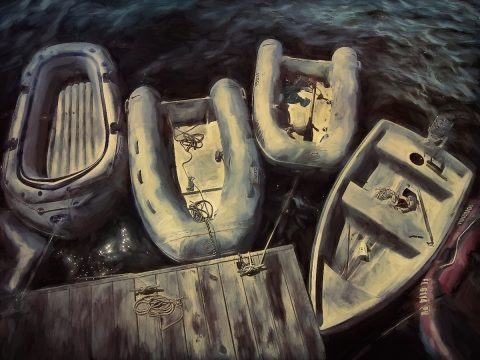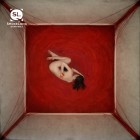This story is timely, of course, located in a specific time—after the election of Donald Trump, we assume—in which many undocumented people and their children, “dreamers,” et al, living in the U. S. now live with an unprecedented fear of deportation, walls built to separate the U. S. from the rest of the Americas, etc. Can you say something about the origins of this story? What inspired you to write it?
I am a teacher, and one of the most disturbing reactions after the election was the reaction of my younger students. The real fear they had that someone they loved was going to be rounded up on November 9th and taken away. I just couldn’t believe that narrative was actually being encouraged. It was difficult to talk them down from that because we could point to very little from the campaign that dispelled that viewpoint. I didn’t want to just tell them, “Everything is going to be OK,” because I’m not sure I believe that myself. Still, after the initial shock wore off, it became clear that the only way to fight this is to connect to one another, in all the little ways, in addition to the big ways of joining movements or running for office.
Are you of Guatemalan ancestry? Or is that an invention? If the latter, why choose Guatemala rather than, say, Mexico or any other Central or South American country? If the former, do you consider yourself (ironically, of course) a “bad Guatemalan,” like the narrator? Or to be more precise: Why does the narrator consider herself a bad Guatemalan? Because she doesn’t speak Spanish or her native tongue?
My husband and I have two children adopted from Guatemala, so I have this constant worry that they will grow into adults and feel like bad Guatemalans because of something we did as parents. It’s very difficult. When they were small, we brought them to these camps that were filled with well-intentioned white parents trying to create for our children a “culture experience,” a culture we had little experience with. So we had these potlucks of “Guatemalan” food, skeleton-drawing parties on the Day of the Dead, marimba classes—and we really had no idea what we were doing. My kids finally got old enough to say, “Please. Just stop.” And although I haven’t done anything as egregious as playing “The Mexican Hat Dance” at parties, people ask questions all the time. I understand—it’s what humans do to try to connect with each other. But we forget sometimes that the children are sitting right there in the grocery cart listening to their mom talk about their story like they’re an item she just picked up. I feel like I’m starting to use this question as therapy or a confessional.
This story is a strange and lovely blend of humor and magical realism. What writers from the Americas have influenced this story? We think of Gabriel Garcia Marquez immediately, of course, but the complex magical realist traditions of Latin American writers are often much different from those in the U. S. Often much more overtly political. Can you say something about your influences?
Well, first, thank you. I do love Gabriel Garcia Marquez, and I teach him to my high school students all the time. But the greatest magical realism book I’ve ever read was Salman Rushdie’s Midnight’s Children. Every time I read the section listing all the children born at midnight and their special powers, I have the same two thoughts: Literature can be pure magic, and I wish I could do this. I feel this way about Jorge Luis Borge’s “Library of Babel,” also. How is it possible that these authors created something this magical with just words? I mean, I know every single one of these words, but I would never have thought to put them in that exact order to create this magic. But they did. And we have the good fortune of being able to read them whenever we want.



 The core workshop of SmokeLong Fitness is all in writing, so you can take part from anywhere at anytime. We are excited about creating a supportive, consistent and structured environment for flash writers to work on their craft in a community. We are thrilled and proud to say that our workshop participants have won, placed, or been listed in every major flash competition. Community works.
The core workshop of SmokeLong Fitness is all in writing, so you can take part from anywhere at anytime. We are excited about creating a supportive, consistent and structured environment for flash writers to work on their craft in a community. We are thrilled and proud to say that our workshop participants have won, placed, or been listed in every major flash competition. Community works.